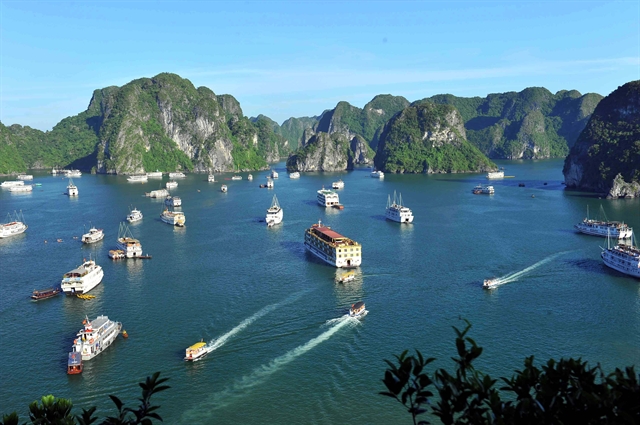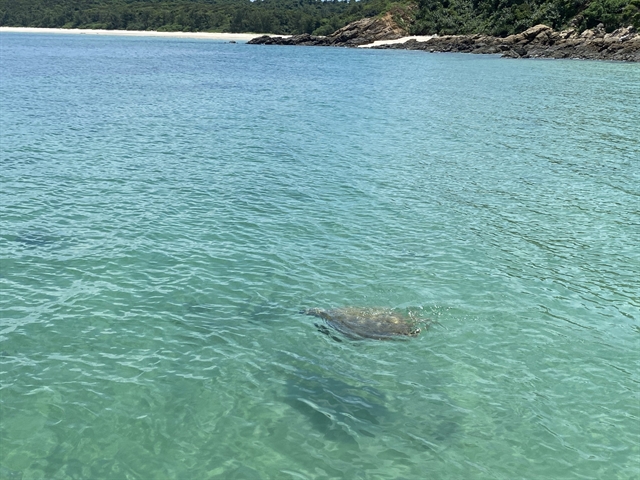 Economy
Economy


|
| Tourist boats on the Hạ Long Bay. —VNA/VNS Photo |
HÀ NỘI — Quảng Ninh, traditionally known as the coal mining province of the North, has made determined strides in greening tourism activities, ensuring sustainable development and cementing tourism as the province's economic powerhouse.
In the face of challenges like climate change and disease outbreaks, particularly the COVID-19 pandemic that shook up tourism, Quảng Ninh tourism has adapted quickly and recovered impressively.
Since 2013, the province has identified a shift in its development approach from "brown" to "green", promoting sustainable development in tourism - the smokeless industry.
On May 24, 2013, the Executive Committee of the provincial Party Committee issued Resolution 07-NQ/TU on the development of tourism in Quảng Ninh Province from 2013 to 2020, with a vision towards 2030. Specifically, the province will develop tourism in the province in a sustainable, professional, modern and efficient manner, with a focus on key areas and points of interest.
The approach has been consistently embedded within policies, strategies and planning frameworks.
As a result, the tourism sector has fully harnessed its existing potential, generating distinctive tourism products.
The growth of tourism has been closely linked with conservation initiatives aimed at preserving and promoting the cultural history and values of local ethnic communities.
Furthermore, there has been a considerable emphasis on sustainable management, responsible natural resource extraction, environmental protection and biodiversity preservation.
Notable examples include agricultural tourism, community-based tourism and ecotourism in Bình Liêu, Hải Hà and Tiên Yên districts, and Móng Cái City. There are also tourism service cooperatives offering boat tours to explore fishing villages, the community-based tourism area of Kỳ Thượng Am Váp farm in Kỳ Thượng commune, or community-based tourism in Yên Đức village in Đông Triều Town.
These initiatives have provided fascinating experiences for visitors and have contributed to promoting cultural values, addressing employment issues and achieving sustainable poverty reduction in the localities.
Nguyễn Vũ Quỳnh Anh, general director of Sun Hospitality Group under Sun Group, appreciated the province’s efforts and achievements in transitioning the economy from ‘brown’ to ‘green’, citing the province's improvements as a model of tourism transformation.
“The provincial government of Quảng Ninh has set the objective of transitioning the economy from ‘brown’ to ‘green’, gradually reducing mining activities and shifting focus towards tourism and services,” Quỳnh Anh said.
“The province has called for investments in a series of key projects to provide momentum for the accelerated growth of the smokeless industry. Thanks to these driving projects, within just five years from 2013 to 2018, Quảng Ninh Province had attracted 100 investment projects with a total capital investment of VNĐ110 trillion (US$4.5 billion).
“Thanks to the right direction and strategic investor attraction for infrastructure development, transportation and tourism infrastructure, which act as powerful catalysts in the economic transformation from 'brown' to 'green', Quảng Ninh has reaped the sweet fruits of remarkable tourism growth,” she said.
More efforts needed
However, alongside the positive aspects, there are still challenges in tourist boat activities that impact the sustainable development of tourism destinations. Issues still persist, such as pollution from transportation, boat docking, onboard sanitation, crew waste, dining services, overnight stays on boats and entertainment activities.
With the support of the Japan International Cooperation Agency (JICA), the Quảng Ninh Tourism Department has developed the "Green Sail" criteria for tourist boats in Hạ Long Bay.
During the pilot phase, 36 tourist boats in Hạ Long Bay have been certified and awarded the prestigious "Green Sail" logo. These boats have demonstrated their commitment to environmental protection, efficient energy use, and contributing to the preservation of the region's heritage, as well as fostering sustainable development in the local economy, culture and society through tourism.
Quảng Ninh Province has also implemented energy-saving solutions and published a comprehensive white paper on green growth in Hạ Long Bay.
Furthermore, proactive measures have been taken to apply advanced technologies, such as water-oil separation techniques for pre-treating wastewater before its discharge into the environment. Direct dumping of waste into the bay has been strictly avoided, and eco-friendly practices like using glass water bottles, paper straws and cups have been adopted during the operation of tourist boats in the bay to minimise environmental harm.
Since 2019, a total of 204 tourism boat businesses and individuals, along with 15 kayak and rowing boat service providers, as well as 51 aquaculture businesses, have made commitments to the Ha Long Bay Management Board.
They have pledged not to use single-use plastic products in their tourism activities on the bay. As a result, an impressive 90 per cent reduction in single-use plastic waste has been achieved, with proper collection points established at various attractions throughout the bay.
Cô Tô Island, another famous destination in Quảng Ninh Province, is also on the move towards building a sustainable green tourism environment.

|
| A sea turtle spotted in the water by Cô Tô Island. — VNA/VNS Photo |
Since last September, the People's Committee of Cô Tô District has implemented a pilot regulation prohibiting visitors from bringing plastic bottles, plastic bags, and other materials that pose an environmental pollution risk to the island.
After one year of effective pilot implementation, starting in the middle of September this year, the district has enforced mandatory regulations that prohibit all visitors from bringing plastic bags and single-use plastic items to the island.
Additionally, all administrative agencies, schools, markets, service businesses and fishing vessels operating within the Cô Tô area are also prohibited from using plastic bags, single-use plastics, and other items that might pollute the marine environment.
The ongoing efforts to safeguard the environment have yielded encouraging outcomes.
The leaders of Cô Tô District believe that due to the pristine climate and marine environment in the area, rare and precious marine species like dolphins, whales and sea turtles have been frequently spotted swimming and surfacing in the water recently.
Despite recent achievements, establishing a truly green, sustainable tourist economy will take time and require more efforts by the provincial government and residents. — VNS




